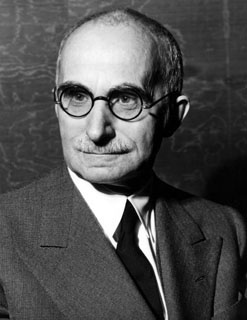| Profile | Major Works | Resources |
Luigi Einaudi, 1874-1961

Luigi Einaudi was a classically-trained public finance economist. His major works were on public finance in the tradition of Italian "Fiscalist" school (i.e. Ferrara, de Viti de Marco, etc.) Einaudi was also an accomplished economic historian.
In 1899, after graduating from law from Turin, Einaudi tried his hand at journalism. He was on the staff of Turin's La Stampa and then, from 1903, on Milan's Corriere della Sera. He was also the Italian correspondent for the liberal English weekly, The Economist.
In 1902, Einaudi became professor of finance at the University of Turin. In 1904, he acquired a joint appointment at the Bocconi University in Milan. From 1900 to 1935, Einaudi was the editor of La riforma sociale. From 1936, he was editor of the Rivista di storia economica until 1943.
An ardent advocate of laissez-faire and liberal democracy, Einaudi was elected to the Italian Senate in 1919. With the rise of the Fascists in 1926, Einaudi stopped his journalistic activities. He cast several important votes against the Mussolini regime, but became more engrossed in his academic pursuits.
Einaudi's most famous contribution is perhaps his 1929 thesis on the "optimal tax". Einaudi argued that every particle of income should be taxed equally, but that standard income taxes fail in this regard as they "tax" savings twice -- first as income, and then on their yield as capital. To avoid this "double taxation", Einaudi recommended the exemption of savings from the income tax base.
Einaudi was appointed rector of the University of Turin in 1943. But, that same year, Einaudi went into exile in Switzerland. He returned in 1945, when he was appointed governor of the Bank of Italy. He was elected to the Italian constituent assembly in 1946, and served in a variety of ministerial posts in the immediate post-war period. From 1948 to 1955, Einaudi was the President of Italian Republic. He deserves much credit for the creation of the post-war Italian "social market economy".
|
Major Works of Luigi Einaudi
|
|
HET
|
|
Resources on Luigi Einaudi
|
All rights reserved, Gonšalo L. Fonseca
